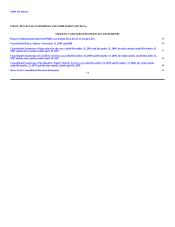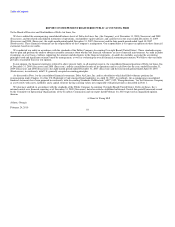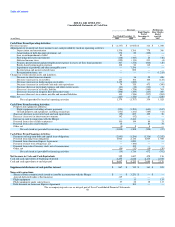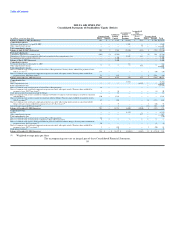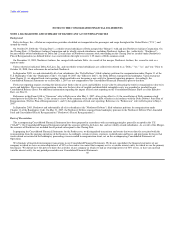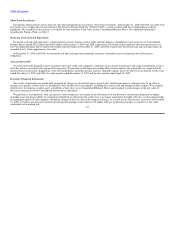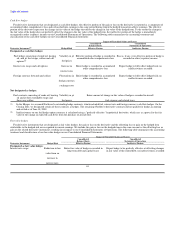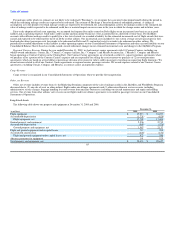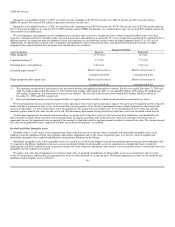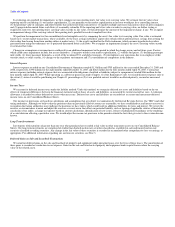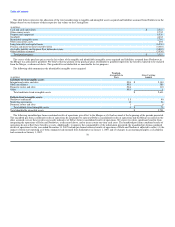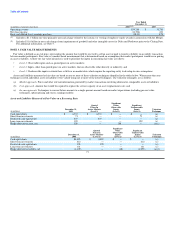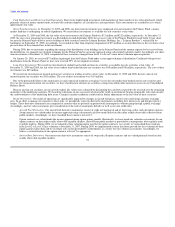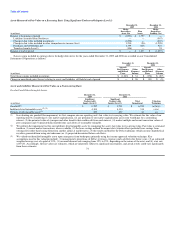Delta Airlines 2009 Annual Report Download - page 69
Download and view the complete annual report
Please find page 69 of the 2009 Delta Airlines annual report below. You can navigate through the pages in the report by either clicking on the pages listed below, or by using the keyword search tool below to find specific information within the annual report.
Table of Contents
Hedge Margin
In accordance with our fuel and interest rate hedge agreements, (1) we may require counterparties to fund the margin associated with our gain position on
hedge contracts and/or (2) counterparties may require us to fund the margin associated with our loss position on these contracts. The amount of the margin, if
any, is periodically adjusted based on the fair value of the hedge contracts. The margin requirements are intended to mitigate a party's exposure to market
volatility and the associated contracting party risk. We do not offset margin funded to counterparties or margin funded to us by counterparties against fair
value amounts recorded for our hedge contracts.
The hedge margin we receive from counterparties is recorded, as appropriate, in cash and cash equivalents or restricted cash, with the offsetting obligation
in accounts payable on our Consolidated Balance Sheets. The hedge margin we provide to counterparties is recorded in hedge margin receivable or restricted
cash on our Consolidated Balance Sheets. All cash flows associated with purchasing and settling fuel hedge contracts are classified as operating cash flows on
our Consolidated Statements of Cash Flow.
Our foreign currency hedge agreements do not require the counterparties or us to fund margin associated with our gain or loss position under those
contracts.
Revenue Recognition
Passenger Revenue
Passenger Tickets. We record sales of passenger tickets in air traffic liability on our Consolidated Balance Sheets. Passenger revenue is recognized when
we provide transportation or when the ticket expires unused, reducing the related air traffic liability. We periodically evaluate the estimated air traffic liability
and record any resulting adjustments in our Consolidated Statements of Operations in the period in which the evaluations are completed. These adjustments
relate primarily to refunds, exchanges, transactions with other airlines and other items for which final settlement occurs in periods subsequent to the sale of
the related tickets at amounts other than the original sales price.
Taxes and Fees. We are required to charge certain taxes and fees on our passenger tickets, including U.S. federal transportation taxes, federal security
charges, airport passenger facility charges and foreign arrival and departure taxes. These taxes and fees are legal assessments on the customer for which we
have an obligation to act as a collection agent. Because we are not entitled to retain these taxes and fees, we do not include such amounts in passenger
revenue. We record a liability when the amounts are collected and reduce the liability when payments are made to the applicable government agency or
operating carrier.
Frequent Flyer Programs. We have a frequent flyer program (the "SkyMiles Program") offering incentives to increase travel on Delta. This program
allows participants to earn mileage credits by flying on Delta, regional air carriers with which we have contract carrier agreements ("Contract Carriers") and
participating airlines, as well as through participating companies such as credit card companies, hotels and car rental agencies. We also sell mileage credits to
other airlines and to non-airline businesses. Mileage credits can be redeemed for free or upgraded air travel on Delta and participating airlines, for
membership in our Sky Club and for other program awards.
In the Merger, we assumed Northwest's frequent flyer program (the "WorldPerks Program"). In October 2009, we completed the consolidation of the
SkyMiles and WorldPerks Programs, which combined miles from each program at a one-to-one ratio. The WorldPerks Program was accounted for under the
same methodology as the SkyMiles Program.
Upon emergence from bankruptcy, we changed our accounting policy to a deferred revenue model for all frequent flyer miles. We account for all miles
earned and sold as separate deliverables in a multiple element revenue arrangement.
We use the residual method for revenue recognition of mileage credits. The fair value of the mileage credit component is determined based on prices at
which we sell mileage credits to other airlines, currently $0.0054 per mile, and is re-evaluated at least annually. Under the residual method, the portion of the
revenue from the sale of mileage credits and the mileage component of passenger ticket sales that approximates fair value is deferred and recognized as
passenger revenue when miles are redeemed and services are provided based on the weighted-average price of all miles that have been deferred. The portion
of the revenue received in excess of the fair value of mileage credits sold (the "Marketing Premium") is recognized in income when the related marketing
services are provided and classified as other, net revenue. 64


